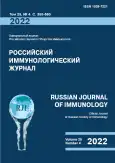Сложный путь к диагнозу «общая вариабельная иммунная недостаточность» (клиническое наблюдение)
- Авторы: Москалец О.В.1
-
Учреждения:
- ГБУЗ МО «Московский областной научно-исследовательский клинический институт имени М.Ф. Владимирского»
- Выпуск: Том 25, № 4 (2022)
- Страницы: 461-464
- Раздел: КРАТКИЕ СООБЩЕНИЯ
- URL: https://journal-vniispk.ru/1028-7221/article/view/120084
- DOI: https://doi.org/10.46235/1028-7221-1173-CWO
- ID: 120084
Цитировать
Полный текст
Аннотация
Общая вариабельная иммунная недостаточность (ОВИН) представляет собой одну из самых распространенных форм первичных иммунодефицитов с преимущественной недостаточностью антител. В отличие от большинства других первичных иммунодефицитов, этот вариант достаточно часто дебютирует у взрослых, что создает определенные сложности в его выявлении. Проявления общей вариабельной иммунной недостаточности весьма многоообразны: инфекционный синдром (инфекции респираторного тракта, септические артриты), диарейный синдром (как инфекционного, так и неинфекционного генеза), аутоиммунный синдром (аутоиммунные цитопении, системные ревматические заболевания), лимфопролиферативный синдром (доброкачественная лимфоидная пролиферация, лимфомы), достаточно часто встречается интерстициальная болезнь легких и гранулематозные изменения по типу саркоидоза. Из-за отсутствия характерной клинической картины диагноз «общая вариабельная иммунная недостаточность» часто устанавливают с большим опозданием, такие больные долго наблюдаются у разных специалистов, и отсутствие патогенетической терапии (внутривенные иммуноглобулины) приводит к неуклонному прогрессированию заболевания а, нередко, и к летальным исходам. В статье представлено клиническое наблюдение, иллюстрирующее сложности в постановке этого диагноза. У женщины, госпитализированной по поводу пневмонии, было выявлено объемное образование в подслизистой толстой кишке. После исключения туберкулеза и лимфомы на основании гистологического исследования был поставлен диагноз «липома толстой кишки». Через несколько лет у пациентки стали периодически увеличиваться подчелюстные лимфоузлы, при повторном гистологическом исследовании установлен диагноз «гранулематозный некротизирующий лимфаденит», пациентка была направлена к ревматологу для исключения системного васкулита. Данный диагноз не подтвердился, но при лабораторном обследовании было выявлено резкое снижение гамма-фракции белков, на этом основании рекомендована консультация иммунолога для исключения иммунодефицита. При дальнейшем обследовании в сыворотке крови выявлено крайне низкое содержание иммуноглобулинов G и M, отсутствие иммуноглобулина A, на основании чего был впервые поставлен диагноз «общая вариабельная иммунная недостаточность». Рекомендована заместительная терапия внутривенными иммуноглобулинами в больших дозах с контролем претрансфузионного уровня, с дальнейшим переходом на поддерживающую схему. Таким образом, можно констатировать, что практикующие врачи до сих пор еще слабо осведомлены о первичных иммунодефицитах, особенно если в клинической картине доминируют неинфекционные проявления. Рутинный анализ содержания общего белка и белковых фракций может дать информацию, позволяющую заподозрить дефицит антител и на этом основании исследовать содержание сывороточных иммуноглобулинов для подтверждения диагноза.
Полный текст
Открыть статью на сайте журналаОб авторах
О. В. Москалец
ГБУЗ МО «Московский областной научно-исследовательский клинический институт имени М.Ф. Владимирского»
Автор, ответственный за переписку.
Email: 6816000@mail.ru
к.м.н., ведущий научный сотрудник лаборатории биомедицинских методов исследований
Россия, МоскваСписок литературы
- Abbot K.J., Gelfland E.W. Common variable immunodeficiency: diagnosis, management and treatment. Immunol. Allergy Clin. North Am., 2015, Vol. 35, no. 4, pp. 637-658.
- Ameratunga R., Allan C., Woon S.T. Defining common variable immunodeficiency disorders in 2020. Immunol. Allergy Clin. North. Am., 2020, Vol. 40, no. 3, pp. 403-420.
- Azizi G., Adolhassani H., Asgardoon M.H., Alinia T., Yazdani R., Mohammadi J., Resaei N., Ochs H.D., Aghamohammadi A. Autoimmunity in common variable immunodeficiency: epidemiology, pathophysioliogy and management. Expert Rev. Clin. Immunol., 2017, Vol. 13, no. 2, pp. 101-115.
- Dimitrova A., Jensen M.D., Bock K., Hilberg O. CVID is a multifaced disease. Ugeskr. Laeger, 2018, Vol. 180, no. 47, V02180105. (In Danish)
- Kokron C.M., Errante P.R., Barros M.T., Baracho G.V., Camargo M.M., Kalil J., Rizzo L.V. Clinical and laboratory aspects of common variable immunodeficiency. An. Acad. Bras. Cienc., 2004, Vol. 76, no. 4, pp. 707-726.
- Maglione P.J. Autoimmune and lymphoproliferative complications of common variable immunodeficiency. Curr. Allergy Asthma Rep., 2016, Vol. 16, no. 3, 19. doi: 10.1007/s11882-016-0597-6.
- Park J.H., Levinson A.I. Granulomatous-lymphocytic interstitial lung disease (GLILD) in common variable immunodeficiency (CVID). Clin. Immunol., 2010, Vol. 134, no. 2, pp. 97-103.
Дополнительные файлы







